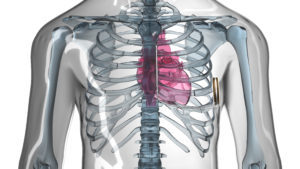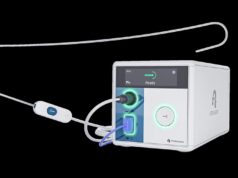 The SMART Pass sensing filter (Boston Scientific), when in patients implanted with the EMBLEM Subcutaneous Implantable Defibrillator (S-ICD) System, successfully reduces inappropriate shocks. This is the result of an analysis of the LATITUDE database, presented during a late-breaking clinical trial at the Heart Rhythm Society’s 39th Annual Scientific Sessions (9 May–12 May, Boston, USA). The analysis was also published online in the Heart Rhythm Journal.
The SMART Pass sensing filter (Boston Scientific), when in patients implanted with the EMBLEM Subcutaneous Implantable Defibrillator (S-ICD) System, successfully reduces inappropriate shocks. This is the result of an analysis of the LATITUDE database, presented during a late-breaking clinical trial at the Heart Rhythm Society’s 39th Annual Scientific Sessions (9 May–12 May, Boston, USA). The analysis was also published online in the Heart Rhythm Journal.
When the sensing filter was in use, the rate of inappropriate shocks was reduced to 4.3% at one year.
The SMART Pass sensing filter is an advanced algorithm within the EMBLEM S-ICD System that filters out certain signals that are the primary reason for inappropriate shocks, while maintaining the ability to accurately detect ventricular tachycardia or ventricular fibrillation and deliver lifesaving therapy. Study authors evaluated the effect of SMART Pass on shocks in ambulatory patients and found that the filter reduced the risk for the first inappropriate shock by 50% and the risk for all inappropriate shocks by 68%, without a negative impact on delivery of appropriate shocks.
“The study data validate the clinical benefit of this sensing methodology to significantly reduce inappropriate shocks by the S-ICD,” says Tom F Brouwer (Department of Clinical and Experimental Cardiology, Academic Medical Center, University of Amsterdam, The Netherlands), presenting author. “At one year, the inappropriate shock rate for patients with the SMART Pass filter in use was as low as rates observed in studies with transvenous implantable cardioverter-defibrillators employing modern programming strategies.”
The prospective, blinded evaluation reviewed one year of remote monitoring data from 1,984 patients that were implanted with an EMBLEM S-ICD System between 2015 and 2016.
“The positive data presented underscore our commitment to advancing this device and providing protection for patients at risk for sudden cardiac death while avoiding the risks and complications associated with transvenous leads,” says Kenneth Stein, senior vice president and chief medical officer, Global Health Policy and Rhythm Management, Boston Scientific. “We are excited for the future of the S-ICD and results from upcoming clinical trials assessing its value when paired with our forthcoming leadless pacemaker as part of a modular device system.”
The S-ICD was included for the first time in the recently updated guidelines from the American Heart Association (AHA), the American College of Cardiology (ACC) and the Heart Rhythm Society (HRS), which recommend the device for the treatment of patients with ventricular arrhythmias and the prevention of sudden cardiac death.









